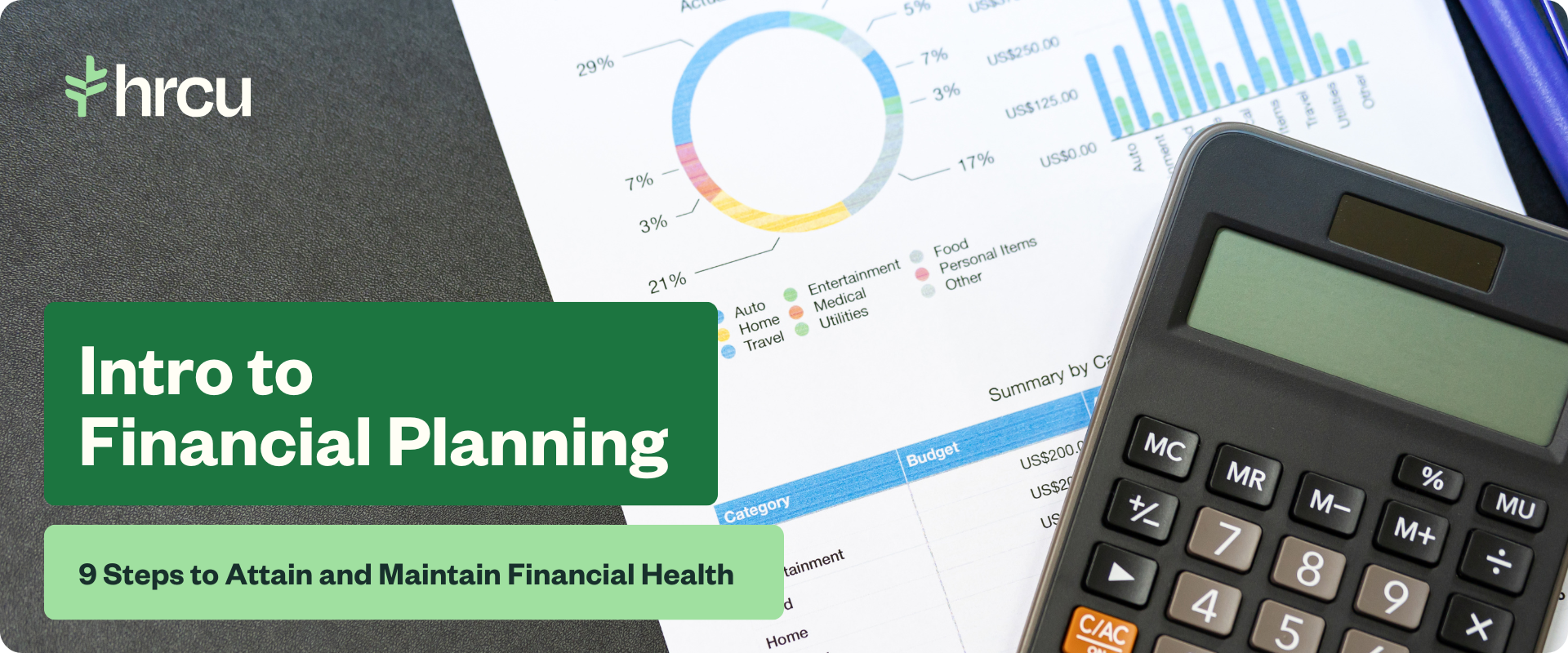March 20, 2024

Financial planning is not just about managing your money; it's about setting goals, creating a roadmap to achieve those goals, and making informed decisions along the way. Whether you're just starting your journey to financial independence or looking to fine-tune your existing plan, understanding the basics of financial planning is essential.
1. Set Clear Goals
The first step in any financial plan is to identify your goals. These could be short-term goals like paying off debt or saving for a vacation, or long-term goals like buying a home or retiring comfortably. Having clear, measurable objectives provides direction and motivation for your financial journey.
2. Assess Your Current Financial Situation
Before you can chart a course for the future, you need to understand where you stand today. Take stock of your income, expenses, assets, and liabilities. This snapshot of your finances will serve as the foundation for your plan. As an HRCU member, you can book a meeting with one of our Financial Service Advisors to talk about your financial goals and what steps you can take towards managing your finances with confidence.
3. Create a Budget
A budget is a crucial tool for managing your finances effectively. It helps you allocate your income towards essential expenses, savings, and discretionary spending. By tracking your spending and adjusting your budget as needed, you can ensure that you're living within your means and making progress towards your goals.
Did you know that you can set budgets within HRCU’s Online Banking and Mobile app? Visit the “Tools” tab on a laptop or desktop to start building budgets for all your accounts.
4. Manage Debt
Debt can be a significant obstacle to financial security, so it's essential to have a plan for managing and reducing it. Prioritize high-interest debt, such as credit card balances, and consider strategies like debt consolidation or refinancing to lower your interest rates and accelerate your repayment efforts. This can be the hardest step in managing your finances, but managing your debt is key to building long-term financial stability.
5. Build an Emergency Fund
Life is full of unexpected expenses, from car repairs to medical emergencies. An emergency fund provides a financial safety net, allowing you to weather these storms without derailing your long-term plans. Aim to save enough to cover three to six months' worth of living expenses in a readily accessible account. Opening an HRCU Club Account is a great way to keep your emergency funds in a separate account from your checking or savings account. Plus, a good rule of thumb is to set up automatic transfers from your checking account to a separate or savings account on a monthly or bi-weekly basis.
6. Save for Retirement
Once you’ve whittled down your debt and built up three to six months of expenses in your emergency fund, it’s time to start putting money away for your retirement. If you’re able to, take advantage of employer-sponsored retirement plans like 401(k)s or IRAs, and contribute enough to qualify for any employer matching contributions. If you're self-employed or your employer doesn't offer a retirement plan, consider options like a SEP-IRA or a solo 401(k). HRCU offers Roth, Traditional, SEP and Educational IRAs to meet your retirement savings needs.
7. Invest Wisely
Investing is a powerful tool for building wealth over the long term, but it's essential to approach it thoughtfully. Consider your risk tolerance, time horizon, and investment objectives when constructing your portfolio. Every person’s financial picture is painted differently, so make sure you seek sound advice when gauging your own risk tolerance and investing goals. Diversification, asset allocation, and regular reviews are also key principles of sound investing.
Northeast Planning Associates is HRCU’s financial investment partner and operates out of our Rochester branch. You can book an online or in-person appointment with one of Northeast Planning’s associates to begin evaluating your retirement options with a trusted professional.
8. Protect Your Assets
Insurance is a vital component of any financial plan, helping to safeguard your assets against unforeseen events. Whether it's health insurance, life insurance, disability insurance, or homeowner's insurance, make sure you have adequate coverage to protect yourself and your loved ones.
No need to look far! We offer Auto, Home, and Life Insurance through our TruStage® partnership with Liberty Mutual to help you save money on your insurance needs.
9. Review and Adjust Regularly
Financial planning is not a one-and-done process; it's an ongoing journey that requires regular review and adjustment. Life circumstances change, goals evolve, and market conditions fluctuate. By regularly reviewing your plan and making necessary adjustments, you can stay on track to achieve financial success.
By setting clear goals, assessing your current situation, and implementing strategies to achieve those goals, you can build a solid foundation for long-term financial security. Remember, the journey to financial success may have its twists and turns, but with a proper map and a commitment to staying the course, you can navigate the path with confidence—while enjoying every stop along the way.




 Membership
Membership Contact
Contact Rates
Rates Appointments
Appointments Locations
Locations